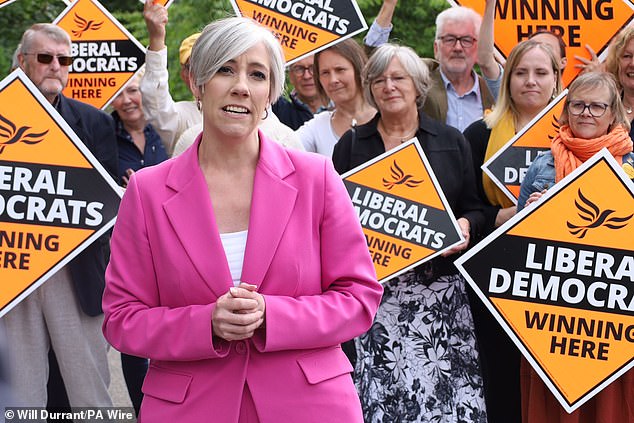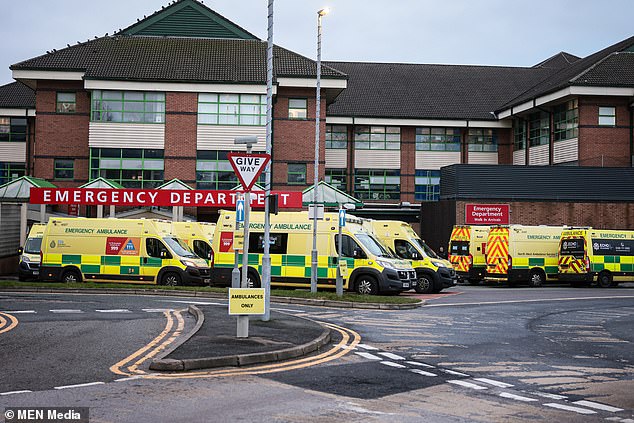Long waits are leading to a “self-care epidemic” where patients avoid hospital care to treat themselves at home, a survey suggests.
A quarter of patients said they had turned to self-help in the past two years, rather than spending hours waiting to see an emergency doctor or nurse.
Of these, almost a fifth ignored advice from their GP or NHS 111 to go to A&E, while more than half (56 per cent) said they were in pain.
One in ten made their own harness to support a limb, while around a third (31 percent) treated their own wounds or self-prescribed medication to prevent the trip.
The survey of 2,213 UK adults was conducted on behalf of the Liberal Democrats earlier this month.
Up to 15 ambulances with patients inside are queuing up at the emergency department of Bolton hospital

Deputy leader Daisy Cooper said it painted a bleak picture of the state of the NHS.
Deputy leader Daisy Cooper said the report painted a bleak picture of the state of the NHS, which has become a key battleground in the run-up to the general election.
He urged the new government to waste no time in drawing up a winter plan.
She said: ‘From homemade slings to self-care of wounds, Tory ministers have left behind an epidemic of do-it-yourself emergencies.
“There is no time to lose: the new government must present a plan to avoid a crisis of waiting times in emergency rooms in winter.”
This comes after another record year for emergency department attendances and waits, with more than 1,100 patients waiting more than 12 hours to be admitted to hospital for an emergency every day.
Between April 2023 and March 2024, 18,638 people had to wait more than three days in emergency services, 60 percent more than the 11,631 in the previous 12 months.
For the latest survey, patients were asked whether they had ever needed to go to the emergency room in the past two years but decided not to because they thought treatment would take too long.

A quarter of patients said they had turned to self-help in the past two years, rather than spending hours waiting to see an emergency doctor or nurse. File image
About 25 percent said yes, 71 percent said no and 4 percent didn’t know.
Instead, four in ten chose to consult their GP (40 percent), almost a third self-medicated (31 percent) and a fifth took time off work to recover (20 percent), the results showed.
Experts say self-help can have devastating consequences. Research shows the risk of death increases after five hours of waiting in an emergency room and gets progressively worse as time goes on.
Earlier this year, the Royal College of Emergency Medicine estimated that more than 250 patients a week could be dying unnecessarily due to long waits in emergency departments in England.
This does not include those who do not make it to the ER, meaning the figure could be much higher.
A Department of Health and Social Care spokesman said: ‘We have inherited a broken NHS and it is unacceptable that so many people are waiting longer than necessary for care.
‘Our mission is to take the healthcare system back to health and build an NHS fit for the future. We know that waiting lists are too long and that is one of the reasons why the Health and Social Care Secretary has ordered a full, independent inquiry into the state of the NHS to expose the scale of the problem.
‘We will tackle the biggest issues facing the NHS head on by offering 40,000 extra appointments every week and improving primary care services to treat patients before they reach A&E, starting with recruiting 1,000 more GPs with £82m of extra funding.’
(tags to translate)dailymail


